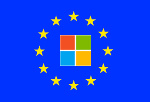EU Commission: we support vendor lock-in
 The European Commission has recently renewed its commitment to a proprietary desktop and secret file formats, the Free Software Foundation Europe (FSFE) writes. The Commission is refusing to make a serious effort to break free from vendor lock-in and is ignoring all available alternatives. In doing so, the EU’s civil service fails to practice what it preaches.
The European Commission has recently renewed its commitment to a proprietary desktop and secret file formats, the Free Software Foundation Europe (FSFE) writes. The Commission is refusing to make a serious effort to break free from vendor lock-in and is ignoring all available alternatives. In doing so, the EU’s civil service fails to practice what it preaches.
In April, the Commission signed two contracts with Microsoft: firstly, an agreement for “high-level services” worth €44 million and secondly a framework agreement on software licensing conditions. The actual licences are provided by Hewlett-Packard under a separate contract from 2012 that itself is worth €50 million. The contracts cover the Commission itself and 54 other EU organisations.
“We are extremely disappointed about the lack of progress here,” says FSFE president Karsten Gerloff. “The Commission has not even looked for viable alternatives. Its lazy approach to software procurement leaves the Commission open to allegations of inertia and worse.”
The Commission recently admitted publicly for the first time (PDF) that it is in “effective captivity” to Microsoft. Documents obtained by the FSFE reveal that the Commission has made no serious effort to find solutions based on open standards. As a consequence, a large part of Europe’s IT sector is essentially prevented from doing business with the Commission.
In a strategy paper (PDF) which the Commission released in response to official questions from Amelia Andersdotter MEP, the EC lays out a three-track approach for its office automation platform for the coming years. This strategy will only deepen the Commission’s reliance on closed proprietary file formats and programs.
“The Commission should be setting a positive example for public administrations across Europe,” comments FSFE’s Gerloff. “Instead, it shirks its responsibility as a public administrations, and simply claims that such alternatives don’t exist. Even the most basic market analysis would have told the Commission that there’s a vibrant free software industry in Europe that it could have relied on.”
Many public sector organisations in Europe are successfully using free software and implementing open standards. Examples include the German city of Munich with its internationally recognised Limux project and (believe it or not! Ed.) the UK government, which has made great strides in using free software and open standards to obtain better value for money in IT procurement.
However, the FSFE says it will continue to work with the Commission in spite of this setback and will help it to improve its software the way it buys software, such as by relying on specifications and standards rather than brand names, by using open invitations to tender instead of talking to a single vendor and by incorporating future exit costs into the price of any new solution. These practices are fast becoming the norm across Europe’s public sector. The EC should practice what it preaches and adopt these practices for its own IT procurement.
